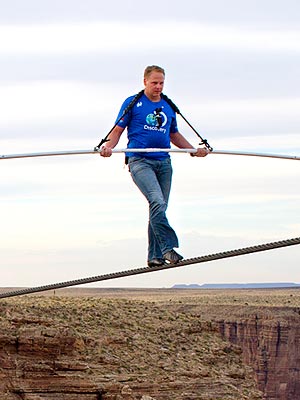|
Surefooted Guidance in Tight Places |
|
Nik Wallenda, the American acrobat, aerialist, and high wire artist, is famous for his daring feats that have amazed millions around the world. Born January 24, 1979, he is the great-grandson of Karl Wallenda, founder of the legendary Flying Wallendas. On June 23, 2013, Wallenda became the first person to skywalk across the Grand Canyon. A two-inch diameter steel cable was rigged 1,400 feet across a 1,500-foot-deep part of the Grand Canyon near the Little Colorado River Gorge in northwestern Arizona. More than 23 million viewers in the United States, and millions more worldwide, watched as Wallenda did his nearly 23-minute skywalk without a harness, net, or safety tether while facing sudden wind gusts of up to 20 mph. Throughout the walk, he could be heard praising and thanking God. He uttered things like, "Thank you, Jesus," "Thank you, Lord," and "Thank you, God, for calming that cable." In an interview with The Christian Post the day after the skywalk, Wallenda said he often talks to God while he is on the wire. He said, "I find that peaceful and relaxing and He's the only one up there listening to me." Wallenda added that his faith in Jesus Christ plays a crucial role in what he does. He said, "My life is based on my faith. I guess the biggest role that it plays is that if I do fall and die, I know where I'm going." While David is not known for walking a high wire, he certainly did experience many trials and hardships in his life. As author of half of the 150 psalms in the Bible's Book of Psalms, he often described them with great emotion. David was chased from his home and became a fugitive of King Saul, who was seeking his life because he was jealous of his success and popularity (Psalm 18, 57, 59, 63, 142). He faced betrayal and constant danger of capture as he hid in the wilderness of Ziph (Psalm 54). David was at times surrounded by enemies threatening his destruction, causing him great distress (Psalm 18). Not all of David's hardships came as a result of his interactions with Saul, but because of his own sins. When he was king of Israel, his adultery with Bathsheba started a cascade of severe repercussions and grief that continued throughout the remainder of his life and that of his family (2 Samuel 12:10-12). King David's sin with Bathsheba led to her being pregnant with a son, to him murdering her husband Uriah, and the loss of their son (2 Samuel 11). Later, his son Amnon raped his half-sister Tamar, and her brother Absalom took revenge by murdering him (2 Samuel 13). After a brief exile, Absalom staged a coup d'état against his father David to take over the kingdom, causing him to flee Jerusalem. The attempted overthrow failed, resulting in the death of Absalom and thousands of soldiers, much to the grief of David (2 Samuel 15-18). Another of David's sons born after Absalom with his fifth wife Haggith, Adonijah, tried to take the throne for himself. But his power play was defeated when David made his son with his eighth wife Bathsheba, Solomon, king of Israel. After David's death, Adonijah once again made a bid for the throne by seeking to marry one of David's concubines and King Solomon had him executed (1 Kings 1-2). Whether David's troubles came from the transgressions of others or his own, he never turned away from God. David trusted in God's mercy and repented when he sinned (Psalm 51; 1 Chronicles 21-22:1). Such was David's relationship with the Lord that He considered him to be a man after His own heart (1 Samuel 13:14; Acts 13:22). Psalm 23 is one of David's most universally recognized and beloved psalms. Probably written late in his life, it expressed his deep trust in God as the Guider and Protector of his steps and the Provider of sustenance and all blessings. Key to this psalm was the assurance of God's presence even through the darkest times of his life, dispelling fear and giving comfort.
David continually praised and thanked God for His goodness and grace as he walked the tightrope of life, confident that the Lord would get him safely to the end of the line and welcome him into His home forever.
While we can appreciate Nik Wallenda's skill on the high wire and his faith in Jesus Christ, all the more can we be inspired by David's faith in God as expressed in the psalms he composed -- especially during hard times. From the heights of life to its lowest depths, they reach into every part of our lives. They give us hope and strengthen our faith in God. We who believe in life and salvation through the death and resurrection of Jesus Christ receive His surefooted guidance as He leads us through the tight places of life to the place He has prepared for us (John 14:1-3).
|
|
| What Is the Gospel? | What Must I Do to Be Saved? | Home | Contact Us | Return | |
